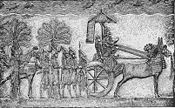
Battle of Halule
Encyclopedia
The Battle of Halule took place in 691 BC between the Assyrian empire
and the rebelling forces of the Babylonians, Chaldea
ns, and Aramaic tribes
.
of Assyria
Babylonia was in a constant state of revolt. Mushezib-Marduk
the Chaldea
n prince chosen as King of Babylon led the Babylonian populace in revolt against Assyria and King Sennacherib.
. As well as the Babylonians, the Aramaic tribes
, the Chaldea
ns and King Khumban-umena III of the Elamites, and all the Zagros tribes (Parsumash, Anzan, Ellipi, etc.) joined in rebellion against the Assyrians. The nucleus of the army consisted of Elamite and Iranian charioteers, infantry, and cavalrymen.
 The battle was indecisive, or at least both sides claimed the victory in their annals and all rulers remained on their thrones, but it is generally agreed that the Assyrians suffered the greatest losses. Humban-numena, allied with the Aramaic tribes
The battle was indecisive, or at least both sides claimed the victory in their annals and all rulers remained on their thrones, but it is generally agreed that the Assyrians suffered the greatest losses. Humban-numena, allied with the Aramaic tribes
and Persians
, claimed to have defeated Sennacherib
at the battle.
Mushezib-Marduk lost his ally when the Elamite king Humban-nimena suffered a stroke later that same year, an opportunity King Sennacherib quickly seized by attacking Babylon, and eventually capturing it after a nine-month siege. Babylon
was destroyed by Sennacherib
. There was further fighting between Elam and Assyria over the next 40 years.
Assyria
Assyria was a Semitic Akkadian kingdom, extant as a nation state from the mid–23rd century BC to 608 BC centred on the Upper Tigris river, in northern Mesopotamia , that came to rule regional empires a number of times through history. It was named for its original capital, the ancient city of Assur...
and the rebelling forces of the Babylonians, Chaldea
Chaldea
Chaldea or Chaldaea , from Greek , Chaldaia; Akkadian ; Hebrew כשדים, Kaśdim; Aramaic: ܟܐܠܕܘ, Kaldo) was a marshy land located in modern-day southern Iraq which came to briefly rule Babylon...
ns, and Aramaic tribes
Aramaeans
The Aramaeans, also Arameans , were a Northwest Semitic semi-nomadic and pastoralist people who originated in what is now modern Syria during the Late Bronze Age and the Iron Age...
.
Background
During the reign of king SennacheribSennacherib
Sennacherib |Sîn]] has replaced brothers for me"; Aramaic: ) was the son of Sargon II, whom he succeeded on the throne of Assyria .-Rise to power:...
of Assyria
Assyria
Assyria was a Semitic Akkadian kingdom, extant as a nation state from the mid–23rd century BC to 608 BC centred on the Upper Tigris river, in northern Mesopotamia , that came to rule regional empires a number of times through history. It was named for its original capital, the ancient city of Assur...
Babylonia was in a constant state of revolt. Mushezib-Marduk
Mushezib-Marduk
Mushezib-Marduk , Chaldean prince chosen as King of Babylon after Nergal-ushezib.He led the Babylonian populace in revolt against Assyria and King Sennacherib in 689 BC, with the support of Elam and King Humban-nimena , at the Battle of Halule...
the Chaldea
Chaldea
Chaldea or Chaldaea , from Greek , Chaldaia; Akkadian ; Hebrew כשדים, Kaśdim; Aramaic: ܟܐܠܕܘ, Kaldo) was a marshy land located in modern-day southern Iraq which came to briefly rule Babylon...
n prince chosen as King of Babylon led the Babylonian populace in revolt against Assyria and King Sennacherib.
Rebellion Forces
Khumma-Menanu recruited a new army to help the Babylonians against the Assyrians, under the leadership of Mushezib-MardukMushezib-Marduk
Mushezib-Marduk , Chaldean prince chosen as King of Babylon after Nergal-ushezib.He led the Babylonian populace in revolt against Assyria and King Sennacherib in 689 BC, with the support of Elam and King Humban-nimena , at the Battle of Halule...
. As well as the Babylonians, the Aramaic tribes
Aramaeans
The Aramaeans, also Arameans , were a Northwest Semitic semi-nomadic and pastoralist people who originated in what is now modern Syria during the Late Bronze Age and the Iron Age...
, the Chaldea
Chaldea
Chaldea or Chaldaea , from Greek , Chaldaia; Akkadian ; Hebrew כשדים, Kaśdim; Aramaic: ܟܐܠܕܘ, Kaldo) was a marshy land located in modern-day southern Iraq which came to briefly rule Babylon...
ns and King Khumban-umena III of the Elamites, and all the Zagros tribes (Parsumash, Anzan, Ellipi, etc.) joined in rebellion against the Assyrians. The nucleus of the army consisted of Elamite and Iranian charioteers, infantry, and cavalrymen.
Result

Aramaeans
The Aramaeans, also Arameans , were a Northwest Semitic semi-nomadic and pastoralist people who originated in what is now modern Syria during the Late Bronze Age and the Iron Age...
and Persians
Persian people
The Persian people are part of the Iranian peoples who speak the modern Persian language and closely akin Iranian dialects and languages. The origin of the ethnic Iranian/Persian peoples are traced to the Ancient Iranian peoples, who were part of the ancient Indo-Iranians and themselves part of...
, claimed to have defeated Sennacherib
Sennacherib
Sennacherib |Sîn]] has replaced brothers for me"; Aramaic: ) was the son of Sargon II, whom he succeeded on the throne of Assyria .-Rise to power:...
at the battle.
Mushezib-Marduk lost his ally when the Elamite king Humban-nimena suffered a stroke later that same year, an opportunity King Sennacherib quickly seized by attacking Babylon, and eventually capturing it after a nine-month siege. Babylon
Babylon
Babylon was an Akkadian city-state of ancient Mesopotamia, the remains of which are found in present-day Al Hillah, Babil Province, Iraq, about 85 kilometers south of Baghdad...
was destroyed by Sennacherib
Sennacherib
Sennacherib |Sîn]] has replaced brothers for me"; Aramaic: ) was the son of Sargon II, whom he succeeded on the throne of Assyria .-Rise to power:...
. There was further fighting between Elam and Assyria over the next 40 years.

